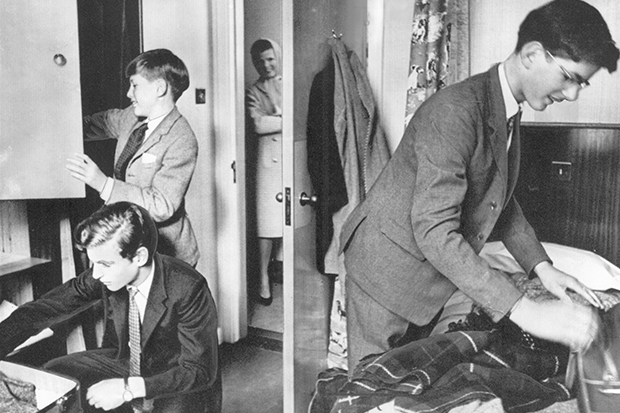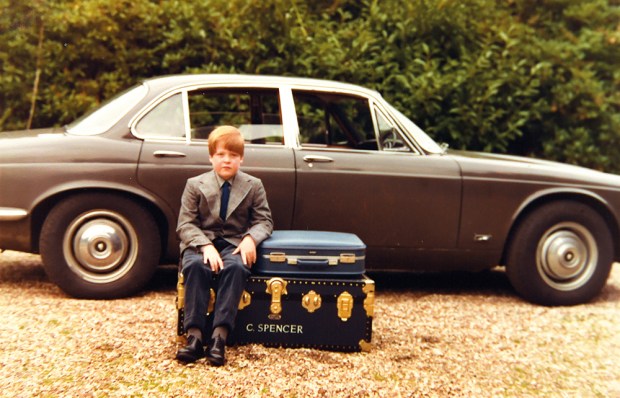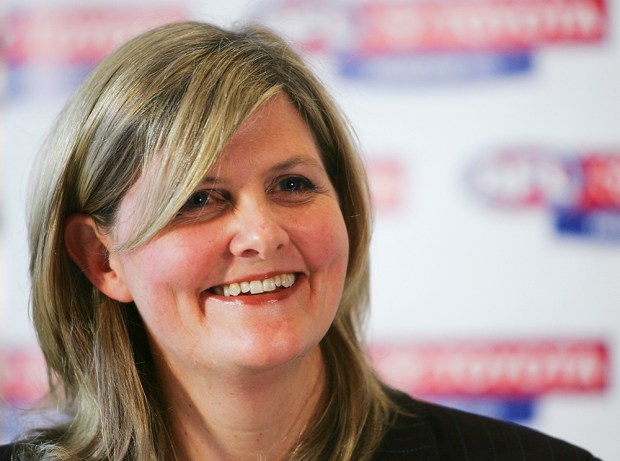The Earl of March, who owns the Goodwood Estate in West Sussex, said recently that he ‘hated’ Eton and ‘couldn’t wait to leave’. This came as a surprise to the interviewer, who immediately asked Charles March why on earth he then packed his own three sons off to his horrible alma mater. ‘Amazing, isn’t it?’ came the reply. ‘It’s completely different now to how it was in my day. Fathers and sons have a completely different relationship — warmer, loving. People I was at school with often barely had relationships with their fathers. Mine was different; my parents have always been modern, liberal thinkers.’
It didn’t make much sense. So what, really, was his problem? What had caused his unhappiness at school? Was he bullied? Serially naughty? Out of his depth?
I doubt it. More likely, it was the relationship with his housemaster that was at fault — and probably his relationship with the majority of his teachers too, and his dame (matron), games master and maybe his peers.
Because where things today are in stark contrast to the 1960s, when young Charlie was toiling over his Latin primer, can be summed up in two words: pastoral care. Yes, the phrase comes across as a little drippy and in the ‘politically correct’ spectrum, but its total absence in days gone by is not something schools can be proud of. No doubt there’s something to be said for a crash course in stiffening the upper lip, and maybe there’s no great harm in being thrown in at the deep end and expected to swim — it may come in handy in later life. But children really will do better with a sympathetic shoulder to lean on.
‘When we are interviewing for new teachers, we make sure the candidates spend as much time as possible in a boarding house mixing with the boys and girls,’ says Andrew Fleck, headmaster of Sedbergh School in Cumbria. ‘The first question we ask when thinking about hiring them is: if this person were to become a role model for our pupils, would we be happy? Then we ask ourselves: can he or she teach?’
Many independent schools have an official head of pastoral care who reports directly to the head and whose role is to liaise with teachers, students and parents. They also meet prospective parents when they come to case the joint. ‘We find that looking after the parents is almost as important as caring for the students,’ says Andrew Fleck. ‘Often it’s the parents who need the most support and help as they start to panic about their children boarding or being put under too much pressure.’
It sounds like a minefield. But that’s what you are paying for in the independent sector — and increasingly what you expect in the state sector, too. A young teacher whom I have known since she was a little girl tells me that the parents’ evening in her state primary is one of the most important events in the school calendar. Yes, of course Mr and Mrs Concerned want to know that Sophie is doing well in her maths, but they are just as keen to know that she is confident, self-assured and happy.
‘Independent schools have really upped their game when it comes to pastoral care,’ says Claudia Dudman, editor of Independent School Parent magazine. ‘There is someone on hand 24/7 to provide a cuddle or a sympathetic ear to a homesick child — with some houseparents and matrons quite used to staying up with a child into the small hours if they are having a hard time.’
There is more of a problem when dealing with those students who come from overseas, of whom there are increasing numbers. ‘They are from a different culture and it is not always easy to persuade them to talk about problems they may have,’ says Andrew Fleck. ‘They might see it as a sign of failure if they seek help or could feel they are letting their families down. We have to work through that.’
Sedburgh is primarily a co-ed boarding school. There are nine boarding houses and about 95 per cent of students are full-time boarders — with between 20 and 25 per cent of students from overseas. All nine housemasters and housemistresses are married, most with young families of their own. Perhaps getting ahead in academia at this level is similar to forging a career in politics — singletons are at a disadvantage.
What’s undoubtedly true is that today’s students are under far more social and psychological pressure than they were even 20 years ago. When I got back to my room in the early 1970s after a day of lessons, sport and steering clear of the authorities, I only had myself for company. Today, all kinds of unpleasantness can pop up on a student’s phone or laptop. Snapchat, Facebook, Instagram — all are potentially unsettling. Switching off from peers is impossible, which means putting the lid on social competitiveness is never going to happen.
What does seem eminently sensible is the way schools today have responded to the modern family, where often both parents work. They offer all types of boarding: full-time, weekly, flexi, which at the very least shares the pastoral load between parents and the school.
It’s also interesting to see that more and more state schools and academies are adopting some sort of house system across all year groups. ‘This helps to create a family-like atmosphere where the older pupils are aware of and look after the younger ones,’ says Julie Robinson, general secretary of the Independent Schools Council. ‘A sense of belonging is vital in producing happy students who will open up about any difficulties they might have.’
The post A home from home at school appeared first on The Spectator.
Got something to add? Join the discussion and comment below.
Get 10 issues for just $10
Subscribe to The Spectator Australia today for the next 10 magazine issues, plus full online access, for just $10.














Comments
Don't miss out
Join the conversation with other Spectator Australia readers. Subscribe to leave a comment.
SUBSCRIBEAlready a subscriber? Log in